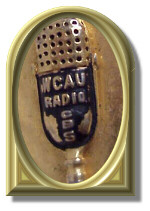

We have a recording in our archive that we don't really know much about. We have dated it as Wednesday, September 17, 1958. Why? The typhoon mentioned in the recording hit Japan hit on September 17th and the newscaster said that the typhoon hit today. Therefore, we have dated it as September 17, 1958.
Next, we had to identify the station. We believe that it is WCAU Radio. Why? Because we have an earlier newscast (about a week earlier) talking about how Lipton Tea was going to start sponsoring this newscast next week and that their representatives would be knocking on doors awarding prizes. That's exactly what the commercial in this newscast talks about, the awarding of prizes to the first week's winners.
Finally, we had to identify the newscaster since he doesn't mention his name. The earlier newscast is labeled as Ken Meyer, WCAU Radio. The voices sound the same, so we can draw the conclusion that the announcer is the same on both cuts.
Longtime tech at WCAU Charlie Higgins tells us that Ken's last name is actually spelled Mayer. Charlie e-mailed:
Realizing how much effort you expended on this recording, it's still difficult for me to say that it is Ken Mayer as his voice was deep and strong but certain inflections lead me to believe it is him.
So that's where we are. We believe it to be a WCAU Radio morning newscast done by Ken Mayer on Wednesday, September 17, 1958.
Now we need to discuss quality. It's terrible. However, it is probably the only recording of this newscast in existence so something is better than nothing. We ran it through noise suppression, and gave it a couple passes through our crackle and pop filtering facilities. We didn't want to change the tonal quality of the recording, so we could do only so much. It is still bad but better than before.
This piece runs about 13 minutes. Next, we did some manual cleanup. By using a digital audio editor, you can actually see crackle, clicks and pops. They look different than regular voice audio. At about 8 minutes into this recording to about 11 minutes in, we manually removed much of the clicks, pops and crackle by literally editing out the pops, clicks, etc. While it sounds impossible to the average person, it isn't. A pop may last only 1/100 of a second and thus when you remove it, it doesn't affect the voice because you removed such a small part of the recording. However, this three minute manual cleanup was very time consuming. It took many hours and we removed hundreds of clicks and pops. We only did a small portion of this recording so there would be a clean sample of the newscast. Someday we may have the time to do the entire recording.
We also get asked why didn't we include the entire newscast since it was a 15 minute broadcast and we used 13 minutes of it. The answer is simple. That's all we have. We do not have the beginning or end of the cast.
![]()
From the official archives of the Broadcast Pioneers of Philadelphia
Audio originally donated by Broadcast Pioneers member Michael Muderick
Digital restoration by Broadcast Pioneers historian Gerry Wilkinson
© 2010, Broadcast Pioneers of Philadelphia
All Rights Reserved
The e-mail address of the Broadcast Pioneers of Philadelphia is pioneers@broadcastpioneers.com